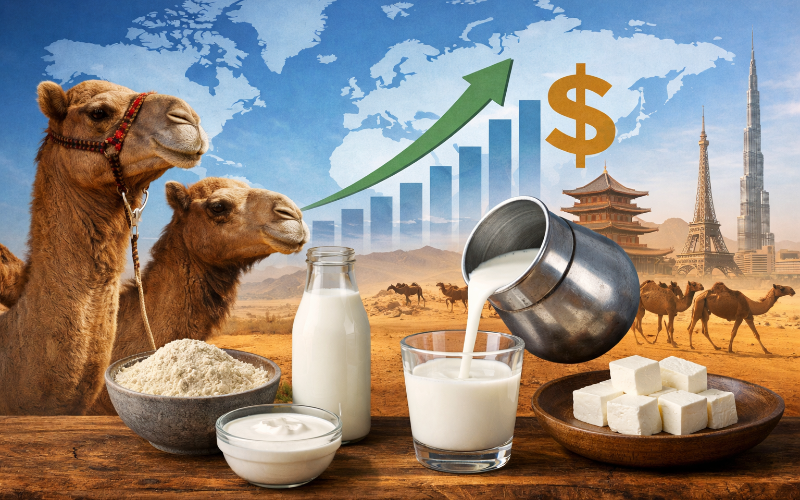Nigeria Spends $1.5 Billion Annually on Dairy Imports
Source: DairyNews.today
President Bola Tinubu has revealed that Nigeria spends approximately $1.5 billion annually on importing milk and dairy products, underscoring the critical need for reforms in the livestock sector.

This announcement was made during a two-day Consultative Workshop on Livestock Reforms in Abuja, where the president highlighted the heavy financial burden the country faces due to its reliance on dairy imports.
“The long-term neglect of the livestock sector has weighed heavily on the country’s import bills, with milk and dairy products accounting for $1.2-1.5 billion,” Tinubu stated, emphasizing the pressing need for investment in local production to reduce import dependency.
Concerns About Local Production and Nutrition
The president expressed concern over Nigeria’s inability to meet its domestic demand for dairy products, particularly in addressing the nutritional needs of children. “A country of over 200 million people cannot serve our children one pint of milk in a classroom per day? That is not right,” Tinubu remarked, pointing to the wider issue of inadequate local production.
Current production levels of animal-source foods, including milk, are insufficient. Nigeria produces only 0.7 billion liters of milk annually, far below what is needed to meet the population's demands. The country's per capita consumption of milk is 8.7 liters per year, significantly below global averages.
Tinubu also expressed dissatisfaction with the low milk yield of Nigerian cattle, which average 0.5 to 1.5 liters per cow per day, compared to a global average of 6.6 liters per day. “We can do much better,” he emphasized, advocating for improvement in local breeds and dairy management.
Livestock Reform Vision
President Tinubu praised the efforts of the Presidential Livestock Reform Implementation Committee, co-chaired by Professors Attahiru Jega and Muhammed Yahaya Kuta, in driving transformation within the sector. He outlined a clear vision for reform, aiming to shift the livestock industry from a subsistence model to a thriving, commercialized industry.
Nigeria's vast livestock resources, including 563 million chickens, 58 million cattle, 124 million goats, 60 million sheep, and 16 million pigs, position the country as the largest livestock producer in West Africa. The president called for collective efforts to harness these resources, stating, “We can bring prosperity to our people. We can feed our children. From grass, we can achieve grace.”
Addressing the Farmer-Herder Crisis
Tinubu also addressed the ongoing farmer-herder conflict, which has led to significant losses of lives and livelihoods, weakened food security, and contributed to displacement and instability in various regions. To address these issues, the president recently created a Ministry of Livestock Development as part of broader measures aimed at resolving the crisis.
The Presidential Committee on the Implementation of Livestock Reforms has proposed a combination of ranching and open grazing as potential solutions to the conflict. These reforms aim to balance the needs of pastoralist herdsmen and settled farmers, reducing competition for resources and mitigating conflict.
With these initiatives, President Tinubu envisions a revitalized livestock sector that can significantly contribute to Nigeria’s Gross Domestic Product (GDP) and create sustainable jobs while addressing the country’s food security challenges.
“The long-term neglect of the livestock sector has weighed heavily on the country’s import bills, with milk and dairy products accounting for $1.2-1.5 billion,” Tinubu stated, emphasizing the pressing need for investment in local production to reduce import dependency.
Concerns About Local Production and Nutrition
The president expressed concern over Nigeria’s inability to meet its domestic demand for dairy products, particularly in addressing the nutritional needs of children. “A country of over 200 million people cannot serve our children one pint of milk in a classroom per day? That is not right,” Tinubu remarked, pointing to the wider issue of inadequate local production.
Current production levels of animal-source foods, including milk, are insufficient. Nigeria produces only 0.7 billion liters of milk annually, far below what is needed to meet the population's demands. The country's per capita consumption of milk is 8.7 liters per year, significantly below global averages.
Tinubu also expressed dissatisfaction with the low milk yield of Nigerian cattle, which average 0.5 to 1.5 liters per cow per day, compared to a global average of 6.6 liters per day. “We can do much better,” he emphasized, advocating for improvement in local breeds and dairy management.
Livestock Reform Vision
President Tinubu praised the efforts of the Presidential Livestock Reform Implementation Committee, co-chaired by Professors Attahiru Jega and Muhammed Yahaya Kuta, in driving transformation within the sector. He outlined a clear vision for reform, aiming to shift the livestock industry from a subsistence model to a thriving, commercialized industry.
Nigeria's vast livestock resources, including 563 million chickens, 58 million cattle, 124 million goats, 60 million sheep, and 16 million pigs, position the country as the largest livestock producer in West Africa. The president called for collective efforts to harness these resources, stating, “We can bring prosperity to our people. We can feed our children. From grass, we can achieve grace.”
Addressing the Farmer-Herder Crisis
Tinubu also addressed the ongoing farmer-herder conflict, which has led to significant losses of lives and livelihoods, weakened food security, and contributed to displacement and instability in various regions. To address these issues, the president recently created a Ministry of Livestock Development as part of broader measures aimed at resolving the crisis.
The Presidential Committee on the Implementation of Livestock Reforms has proposed a combination of ranching and open grazing as potential solutions to the conflict. These reforms aim to balance the needs of pastoralist herdsmen and settled farmers, reducing competition for resources and mitigating conflict.
With these initiatives, President Tinubu envisions a revitalized livestock sector that can significantly contribute to Nigeria’s Gross Domestic Product (GDP) and create sustainable jobs while addressing the country’s food security challenges.
Key News of the Week










